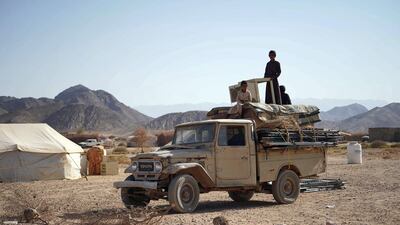Missiles fired by Yemen's Iran-backed Houthi rebels hit residential areas in the city of Marib at the weekend, as fierce fighting forced thousands of families displaced by the civil war to flee once again.
Two of the weapons fell in the Yemen Gas Company neighbourhood of Marib city on Saturday night, while four missiles hit Al Rawdha neighbourhood in the city centre the night before, residents told The National.
"One of the missiles fired by the Houthis fell near my house. It caused huge destruction to a grocery store and minor damage to our houses," a resident of Al Rawdha said.
The missile strikes came as fierce clashes took place around Al Balaq mountain west of the city between the rebels and tribal fighters backed by the Saudi-led coalition supporting the government.
The pro-government forces regained full control over the mountain, which overlooks the city and the Marib Dam.
"Our fighters, along with divisions from the pro-government forces, drove out the Houthis from around Al Balaq and secured the whole mountain chain west of the city," a tribal source told The National on Sunday.
"Dozens of Houthi fighters were killed in the clashes, their bodies are still scattered around the mountain."
The rebels are pressing an offensive launched in early February to capture Marib province, the last major government-controlled territory in northern Yemen.
The attack is worsening the plight of more than 2,231,000 people who have taken shelter in the province after fleeing other areas during the country's six-year civil war.
Families have been fleeing camps in Sirwah and Raghwan districts of the province, and from camps on the western and southern outskirts of Marib city.
"The humanitarian response to IDPs' needs is still very weak, which puts the lives of thousands at risk," said Khaled Musaed, head of the IDPs Executive Unit, the government agency for internally displaced people.
"Hundreds of families displaced from their camps in Sirwah to Marib city cannot find shelter, while other families received tents, but still need basic services, such as clean water and toilets," Dr Musaed told The National.
According to a survey carried out by his agency, there are 139 IDP camps in Marib province that host 31,411 displaced families.
The Yemeni Foreign Ministry said it was surprised at the lack of response from humanitarian organisations.
A statement released by the ministry on Saturday said the NGOs had "been watching the risk faced by millions of civilians and IDPs as a result of the Houthi assault", but their actions "didn't rise to the level of the least humanitarian needs".

